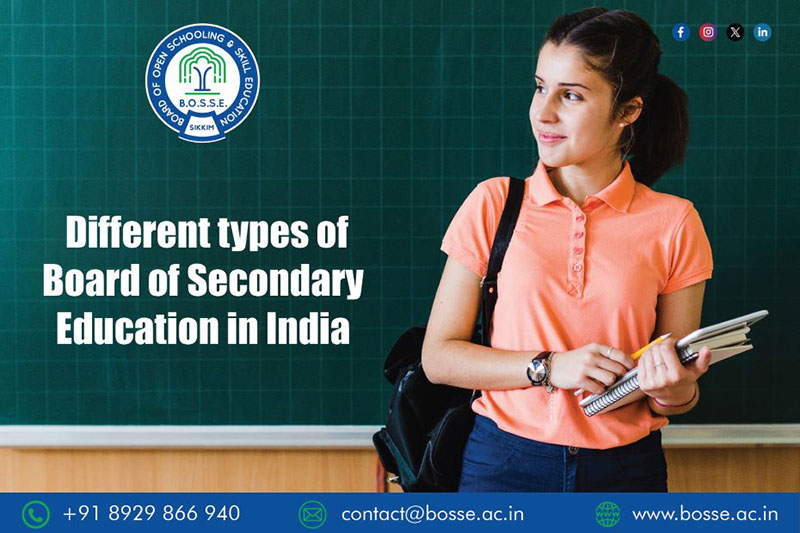In the vast and diverse educational landscape of India, the Board of Secondary Education plays a crucial role in shaping the academic journey of millions of students. These boards are responsible for setting the curriculum, conducting examinations, and ensuring the overall quality of secondary education across the country. With various boards operating in different states and regions, each catering to distinct needs and aspirations, understanding their types becomes essential for students, parents, and educators alike.
National Institute of Open Schooling (NIOS): NIOS is an autonomous institution under the Ministry of Education, Government of India. It caters to students who are unable to attend regular schools due to various reasons such as geographical constraints, financial limitations, or personal circumstances. NIOS offers flexible learning opportunities through open and distance education, allowing students to complete their secondary education at their own pace. It provides study materials, online resources, and conducts examinations for certification.
The Board of Open Schooling and Skill Education (BOSSE) is the ever-evolving initiative in the landscape of education in India which is also recognized by National Institute of Open Schooling (NIOS) . It has emerged as transformative agents that aim to build a literate and aware society. BOSSE represents a dynamic convergence of open schooling principles and skill development imperatives, aiming to provide inclusive and practical education opportunities to a diverse range of learners.
The Bihar Board of Open Schooling and Examination BBOSE is a State Board was established as an autonomous organization under the Education Department of the Government of Bihar in February 2011.Its primary goal is to offer education and examinations to a diverse group of learners who may not be able to attend traditional schools due to various reasons. BBOSE conducts examinations for secondary and senior secondary levels, equivalent to class 10 and class 12 respectively, following the syllabus prescribed by the Bihar School Examination Board (BSEB). It provides study materials, conducts examinations, and awards certificates to successful candidates. The board caters to a diverse range of learners, including school dropouts, working professionals, and those residing in remote areas where regular schooling facilities may not be available. Its flexible learning approach allows students to study at their own pace and convenience, making education accessible to a wider population across Bihar.
Each type of Board of Secondary Education in India brings its unique set of advantages and challenges. While some prioritize academic rigor and standardized assessments, others emphasize flexibility and inclusivity. Ultimately, the choice of board depends on the individual needs, aspirations, and circumstances of students and their families. Regardless of the board chosen, the primary goal remains the same – to empower students with knowledge, skills, and values to thrive in an ever-changing world.
Let’s delve into the significance and functioning of the Board of Secondary Education
- Inclusive Education: The Board of Secondary Education embodies the ethos of inclusive education by reaching out to marginalized and underserved communities, including school dropouts, working professionals, and individuals with special needs. Through open schooling methodologies, the Board of Secondary Education ensures that education is accessible to all, irrespective of geographical constraints, financial limitations, or personal circumstances. By removing barriers to learning, the Board of Secondary Education fosters a more equitable and inclusive society.
- Flexible Learning Pathways: The Board of Secondary Education offers flexible learning pathways that allow learners to pursue education at their own pace and convenience. Whether it’s completing secondary or senior secondary education, acquiring vocational skills, or upskilling for career advancement, the Board of Secondary Education provides a range of options tailored to the diverse needs and aspirations of learners. This flexibility empowers individuals to balance their educational pursuits with other commitments, such as work or family responsibilities.
- Vocational Skill Development: One of the distinguishing features of the Board of Secondary Education is its emphasis on vocational skill development. Recognizing the importance of practical skills in today’s job market, the Board of Secondary Education integrates vocational education and training into its curriculum. By offering courses in sectors like healthcare, hospitality, IT, agriculture, and manufacturing, the Board of Secondary Education equips learners with industry-relevant skills that enhance their employability and entrepreneurship prospects. Through partnerships with industry stakeholders, the Board of Secondary Education ensures that its skill development programs align with current market demands.
- Recognition and Certification: The Board of Secondary Education certifications hold significance in the realm of education and employment. They are recognized by various universities, colleges, and employers across India, enabling learners to seamlessly transition to higher education or enter the workforce. the Board of Secondary Education certifications validate not only academic achievements but also practical skills acquired through vocational training, providing learners with a holistic credential that reflects their capabilities and competencies.
- Innovation and Adaptability: The Board of Secondary Education operates in a dynamic environment characterized by rapid technological advancements and evolving skill requirements. As such, it remains committed to innovation and adaptability in its approach to education and skill development. By leveraging digital technologies, online learning platforms, and interactive teaching methods, the Board of Secondary Education stays abreast of emerging trends and best practices in education delivery. It also continually updates its curriculum to align with industry standards and societal needs, ensuring that learners are equipped with relevant knowledge and skills for the future.
The Board of Secondary Education represents a pioneering initiative in the realm of education and skill development in India. By championing inclusivity, flexibility, vocational training, and innovation, the Board of Secondary Education empowers learners to unlock their full potential and pursue meaningful pathways to personal and professional success. As the Board of Secondary Education continues to evolve and expand its reach, it holds the promise of creating a more equitable, skilled, and prosperous society for all.
